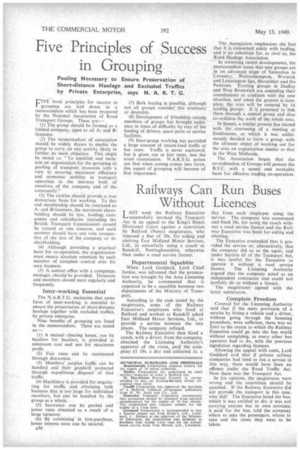Railways Can Run Buses Without Licences
Page 24

If you've noticed an error in this article please click here to report it so we can fix it.
LAST week the Railway Executive successfully invoked the Transport Act in an appeal to the King's Bench Divisional Court against a conviction by Retford (Notts) magistrates, who imposed a fine of 20s. for aiding and abetting East Midland Motor Services, Ltd., in unlawfully using a coach at Ranskill, Nottinghamshire, otherwise than under a road service licence.
Departmental Squabble
When Lord Goddard, Lord Chief Justice, was informed that the prosecution was brought by the Area Licensing Authority, he commented that it appeared to be a squabble between two departments of the Ministry of Transport. According to the case stated by the magistrates, some of the Railway Executive's employees who lived at Retford and worked at Ranskill asked East Midland Motor Services, Ltd., to provide a service between the two places. The company refused.
The Railway Executive then hired a coach, with a driver, from the company, obtained the Licensing Authority's approval of the route, paid the company El 19s. a day and collected Is. a
day from each employee using the service. The company was summoned and fined 20s. for using the' coach without a road service licence and the Rail= way Executive was fined for aiding and abetting.
The Executive contended that it provided the service or, alternatively, that the company did so as the agent, and under Section 65 of the Transport Act, it was lawful for the Executive to operate it without a road service licence. The Licensing Authority argued that the company acted as an independent contractor and could not lawfully do so without a licence.
The magistrates agreed with the latter submission.
Complete Freedom •
Counsel for the Licensing Authority said that if the mere provision of a service by hiring a vehicle and a driver, without going through the licensing procedure, were sufficient, there was no limit to the extent to which the Railway .Executive could go into the bus world without complying, as every other bus operator had to do, with the previous legislation regarding licences.
Allowing the appeal with costs, Lord Goddard said that if private railway companies had tried to run a service in this way, there would have been an offence under the Road Traffic Act. Now there was the Transport Act.
In his opinion, the magistrates were wrong and the conviction should be quashed. If the Railway Executive did not provide the transport in this case, who did? The Executive hired the bus, which it was entitled to do; it was not carrying anyone but its own servants; it paid for the bus, told the company where to take the passengers, whom to take and the times they were to be taken.


























